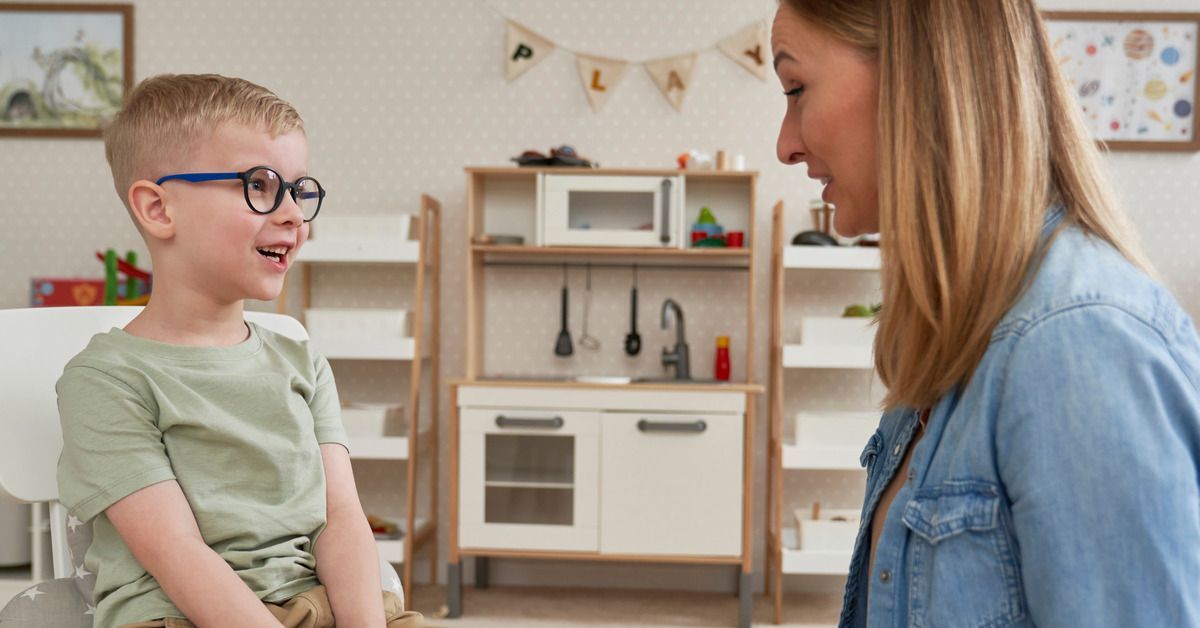Everything You Need To Know About Echolalia and Autism
Understanding language and communication in children on the autism spectrum can sometimes be difficult, especially when unique quirks appear during interactions. One such characteristic is echolalia, a phenomenon that has intrigued parents, educators, and therapists alike.
For parents and caregivers, unraveling the complexities of echolalia is a major step toward understanding their child’s needs. While it might initially seem puzzling to hear repeated phrases or words, these verbal patterns can provide important clues about how a child processes language and communicates. This guide to everything you need to know about echolalia and autism is an excellent resource for better connecting with and supporting children showing signs of echolalia.
What Is Echolalia?
Echolalia is repeating words, phrases, or sounds spoken by others, often verbatim. Children might mimic what they’ve just heard, or they might recall and repeat something they encountered hours or even days before. This repetition serves different purposes depending on the context and child.
Immediate echolalia happens when a child directly echoes what was just said, often instantaneously. For example, when you ask a child if they would like some water, they may repeat, “Would you like some water?” rather than responding.
Delayed echolalia, on the other hand, involves recalling phrases or sentences long after hearing them. This might include quoting favorite lines from a TV show or repeating things said during a past experience.
Echolalia in Children With Autism

Echolalia plays a big role in the communication development of children with autism. For many, it’s an important stage in their language acquisition process. By repeating phrases, children can start learning sentence structure and the rhythm of conversation.
For children with limited verbal abilities, echolalia is often a vital tool for expressing thoughts, emotions, or needs. It helps bridge the gap when other communication methods are not yet accessible, providing a way for children to engage with the world around them.
However, while echolalia can aid in language development, it can also present challenges. The frequent repetition of phrases can complicate social interactions, making it difficult for children to engage in meaningful conversations. Echolalia may lead to delays in providing direct responses, which can prevent children from expressing their preferences or emotions effectively. These communication barriers often lead to frustration for the child and their caregivers, emphasizing the importance of addressing echolalia in therapy.
Why Does Echolalia Happen?
To fully comprehend why echolalia occurs, it’s important to consider the contexts in which it manifests. For many children on the autism spectrum, echolalia reflects delays in language and communication development. Instead of producing original sentences, repeated phrases become a placeholder while the child’s brain works to process language more fully.
Echolalia may also be a coping mechanism, helping children regulate their emotions or respond to overstimulating environments. Repeating familiar words or phrases can bring comfort or a sense of predictability in moments of anxiety or sensory overwhelm. Reinforcement and imitation can also play a pivotal role in this behavior, as children may echo words they’ve frequently heard in daily interactions or media.
How Echolalia Is Addressed in Autism Therapy Services
Autism therapy services often helps children with echolalia build meaningful communication skills. Applied behavior analysis (ABA) therapy is particularly effective in this regard, aiming to reduce reliance on echolalia and foster more functional dialogue.
Behavioral therapists use tailored strategies to meet the unique needs of each child. Prompting and modeling are frequently employed to demonstrate how to build responses outside of repetition. For example, a therapist might gently guide a child to transform echoed phrases into statements or questions that serve a clearer communicative purpose. Shaping techniques also encourage children to expand their verbal repertoire step by step, beginning with simple words and transitioning to fuller sentences.
Therapy is never one-size-fits-all. Customizing interventions based on a child’s specific abilities and challenges is essential. This personalized approach ensures that the skills being developed are as impactful and relevant as possible, fostering growth in communication while respecting the child’s unique learning style.
Practical Tips for Parents and Caregivers

Parents and caregivers can play a meaningful role in supporting a child’s communication skills, especially at home. When children display echolalia, their language efforts should be met with encouragement rather than frustration. Providing positive reinforcement creates an environment where children feel safe experimenting with speech.
Opportunities for more organic communication can also make a big difference. Use open-ended questions to elicit responses beyond simple yes or no answers, and create scenarios where the child is encouraged to express their needs or desires instead of repeating phrases.
Don’t overlook the importance of celebrating small wins. Effective communication might begin with a single word, a small sentence, or eye contact during a conversation. Acknowledging this progress helps build confidence and provides children with the motivation they need to continue making incremental improvements.
When To Seek Professional Help
While some stages of echolalia may resolve naturally with development, professional support can still be highly beneficial. If a child struggles to transition away from echolalia or exhibits frustration when trying to respond meaningfully, it may be time to consult therapy services.
Early intervention can yield major advantages, equipping children with the tools they need to grow in their communication abilities. Whether it’s through structured ABA therapy, speech therapy, or a combination of tailored approaches, professional services pave the way for children to thrive.
Supporting Communication Growth
Understanding everything you need to know about echolalia and autism helps caregivers and educators adopt a more compassionate perspective on how children with autism communicate. While echolalia presents its own set of challenges, it’s also an opportunity for growth and connection when addressed thoughtfully.
With the right blend of patience, support, and professional guidance, children with echolalia can unlock meaningful ways to express themselves and engage more confidently with the world. Partnering with experienced therapists ensures that every child has access to the personalized solutions they need for success.







